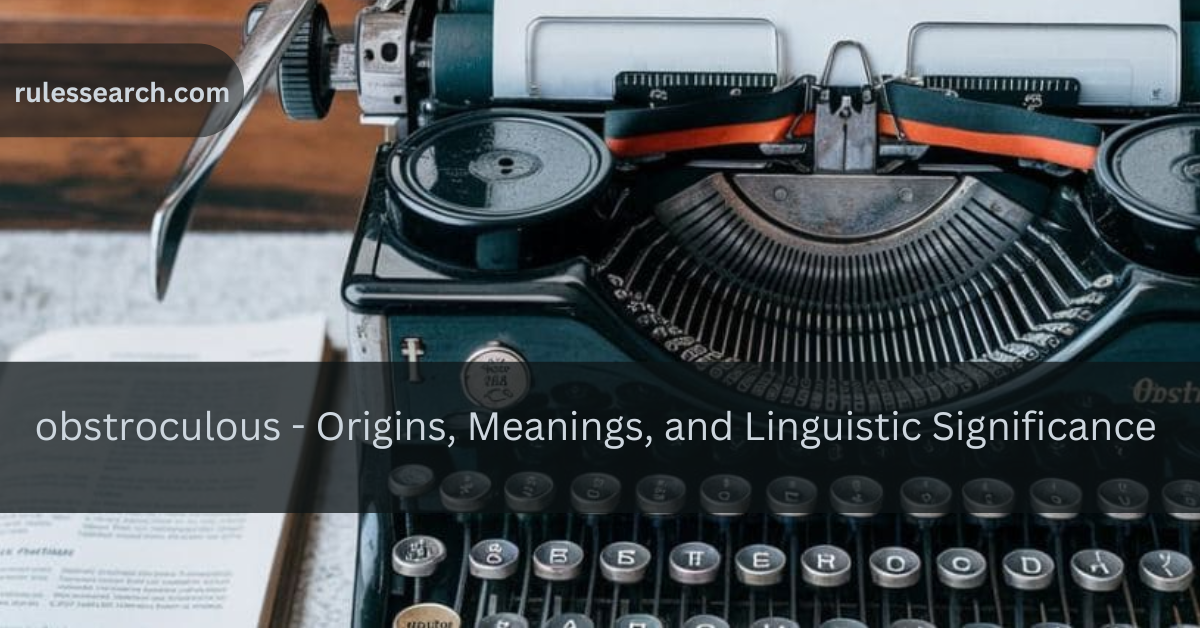In the ever-evolving landscape of the English language, certain words captivate our curiosity with their unique construction and potential meaning. Obstroculous is one such term that, despite its limited usage, offers a fascinating glimpse into how language can adapt and expand. This article explores the origins, meanings, and potential applications of obstroculous, providing a thorough understanding of this intriguing word.
Origins of Obstroculous
To appreciate the word obstroculous, we first need to explore its origins and how it was constructed. Although obstroculous is not a standard entry in most dictionaries, its components suggest a blend of Latin roots and English affixes.
Latin Roots and Construction
- Prefix Ob-:
Meaning: The prefix ob- is derived from Latin, where it generally means against, toward, or in the way of. In many Latin-derived English words, ob- indicates opposition or obstruction.
Examples: Words like obstruct (to block or hinder) and obstacle (something that stands in the way) share this prefix, reflecting similar themes of blockage or interference.
- Root Stroc-:
Meaning: The root stroc- is reminiscent of obstructus, which is the Latin past participle of obstruere, meaning to block up or to build against. This root implies a barrier or impediment.
Relation: Obstruct and obstruction are direct descendants of this Latin root, emphasizing their relevance to the concept of hindrance.
- Suffix -ulous:
Meaning: The suffix -ulous is used in English to form adjectives that describe a characteristic or quality. It often denotes full of or characterized by.
Examples: Words like spacious (full of space) or mysterious (full of mystery) use this suffix to describe the nature of something.
Etymological Construction
Combining these elements, obstroculous can be interpreted as an adjective meaning characterized by obstruction or full of obstacles. The term appears to be a creative construction aimed at filling a niche for describing situations or entities that hinder or block progress.
Meaning and Usage of Obstroculous
Understanding obstroculous involves examining its potential definitions and how it could be applied in various contexts.
Definition and Interpretation
- Primary Meaning:
Interpretation: Obstroculous likely describes something that causes or is characterized by obstruction. It reflects an attribute of being obstructive or problematic, derived from its etymological components.
Example: In a sentence: The new regulations were deemed obstroculous by many businesses due to their complexity.
- Contextual Usage:
Literary and Academic: In literature or academic writing, obstroculous might be used to convey a specific type of obstruction or hindrance that requires precise description. For example, The obstroculous nature of the bureaucratic process hindered the swift implementation of the reforms.
Everyday Language: While not common in everyday conversation, obstroculous could be used to add a touch of sophistication or exactitude when discussing challenges or barriers. For instance, The project faced numerous obstroculous issues that delayed its completion.
Potential Applications
- Literary Context:
Rich Description: Writers could use obstroculous to add depth to their descriptions of impediments or challenges, providing readers with a nuanced understanding of obstacles.
Creative Writing: In fiction, obstroculous might describe characters or situations that create significant barriers or conflicts, enhancing the narrative.
- Professional and Technical Fields:
Technical Writing: In technical fields, obstroculous could describe processes or elements that create significant difficulties or inefficiencies. For example, The obstroculous nature of the legacy system presented several hurdles for the IT department.
The Peculiar Status of Obstroculous
Obstroculous holds a peculiar place in the English language, reflecting broader trends in linguistic evolution and the challenges of integrating new terms.
Linguistic Novelty
- Emerging Terms:
Creative Construction: New words often emerge from creative uses of existing language elements, reflecting evolving needs and expressions. Obstroculous is an example of such linguistic innovation, showcasing how language adapts to describe new or specific concepts.
Language Evolution: The creation and adoption of new terms like obstroculous illustrate the dynamic nature of language, where new words can fill gaps in expression and communication.
- Acceptance and Recognition:
Broader Adoption: For obstroculous to gain wider recognition, it would need to be adopted by a broader audience and included in more dictionaries and academic references. This process involves consistent use and acknowledgment by writers, scholars, and the general public.
Challenges and Opportunities
- Integration into Common Usage:
Consistency: Integrating obstroculous into everyday language would require consistent use in diverse contexts. Writers, speakers, and educators can contribute to its recognition by incorporating it thoughtfully in their communication.
Impact on Language: If adopted, obstroculous could enrich the English lexicon by providing a precise term for discussing obstructive elements. Its use would offer a way to describe specific types of hindrances with greater clarity.
- Potential Impact:
Enriching Vocabulary: The adoption of obstroculous could expand the range of vocabulary available for describing complex ideas. It highlights the potential for new words to enhance expression and understanding in various fields.
Conclusion
The exploration of obstroculous reveals a term with intriguing potential. While it is not yet a staple of the English language, its origins and construction suggest a word that could offer valuable nuance in describing obstructive elements. As language evolves, terms like obstroculous highlight the dynamic nature of English and the ongoing quest for precision in communication.
By understanding and potentially adopting such terms, we contribute to the rich tapestry of language, embracing new ways to articulate complex ideas. Obstroculous represents an opportunity to refine our vocabulary and enhance our ability to describe obstacles and hindrances with greater accuracy.
FAQs
What does obstroculous mean?
Obstroculous likely means characterized by obstruction or full of obstacles. It describes something that hinders progress or creates barriers, based on its etymological components.
Where does the word obstroculous come from?
The term obstroculous is constructed from Latin roots and English suffixes. It combines ob- (against), stroc- (related to obstruction), and -ulous (full of) to form an adjective meaning obstructive.
Is obstroculous a commonly used word?
No, obstroculous is not widely used and does not appear in most standard dictionaries. It is a novel term that has not yet gained widespread recognition.
How can I use obstroculous in a sentence?
You can use obstroculous to describe something that is obstructive or problematic. For example: The obstacles in the approval process were considered obstroculous by the project team.
Why is obstroculous not in most dictionaries?
Obstroculous is a newly coined term and may not yet have gained sufficient usage or recognition to be included in standard dictionaries. It requires broader adoption to achieve dictionary status.
Can obstroculous be used in academic writing?
Yes, obstroculous can be used in academic writing to provide a precise term for discussing obstacles or hindrances. Its use would depend on the context and the acceptance by the academic community.
How can new words like obstroculous become widely accepted?
New words gain acceptance through consistent use in various contexts, including literature, media, and everyday conversation. Their inclusion in dictionaries and academic references also contributes to their recognition.
What are some synonyms for obstroculous?
Synonyms for obstroculous might include obstructive, hindering, or impeding. While these terms convey similar meanings, obstroculous offers a more specific nuance.
Are there similar words to obstroculous in other languages?
Similar concepts may exist in other languages, but obstroculous is unique in its construction and usage within English. The term reflects a specific blend of Latin and English elements.
How can I learn more about unique or emerging words like obstroculous?
To learn more about unique or emerging words, you can explore linguistic resources, follow language blogs, and participate in language forums. Engaging with evolving language trends can provide insights into new terms and their usage.



